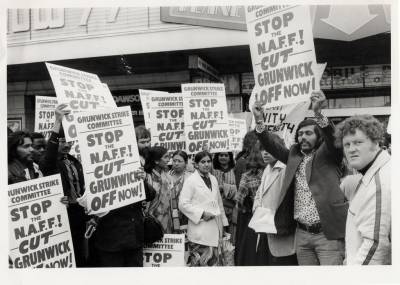Jayaben Desai was born in 1933 in Dharmaj – a village in Gujarat in India. As a teenager, she took part in the Indian Independence movement against British rule.
When she was 24 she got married to Sunyakant Desai who owned a business in Tanzania. After the wedding Jayaben stayed on in India, which is where her first child was born, to complete a tailoring course. She joined her husband in Dar-es-Salaam when their son was nearly two and, after the birth of their second son, did home-based sewing work for a few years. When Tanganika and Zanzibar got their independence to become Tanzania, it like many East African countries adopted policies to promote the African population. Many Asian families in East African countries left like the Desai family. They went to India in 1964.
Jayaben’s husband went to London first and in October 1967 she and their children joined them. With the passing of the 1968 Commonwealth Immigrants Act, the Desai family would have needed a visa to enter Britain the following year, even if they held British passports. Also, because of racial prejudice, housing was very difficult to find in London in the 1960s and 1970s.
Jayaben started work at the Grunwick film processing laboratory in Willesden, North London in 1974. Like many women in her situation she was willing to accept low status employment in order to contribute to her family’s well-being. Working conditions were very difficult. For example, members of the mainly Asian female workforce had to ask permission to go to the toilet, and were threatened with dismissal if they failed to keep up with the very fast pace of the work. When the line manager compared her and her colleagues to chattering monkeys, Jayaben replied ‘What you are running here is not a factory, it is a zoo. In a zoo, there are many types of animals. Some are monkeys that dance on your fingertips, others are lions who can bite your head off. We are the lions, Mr. Manager’. And with those words she led the workforce out on strike on 20 August 1976 and joined the trade union, APEX (now part of GMB). To quote Jack Dromey’s Guardian obituary of the woman always known as Mrs Desai, ‘The events that followed contributed immeasurably to increasing the level of respect shown to newly arrived immigrant workers, many of them women – especially by their colleagues in the existing workforce’.
George Ward, the owner of the factory, announced on 2 September 1976 that he would refuse to recognise the union and was sacking the strikers. Jayaben travelled across the country to win support for the workers and their unionisation.
 As support for the workers grew there were mass pickets of ordinary people outside the factory. The police were aggressive to the strikers and their supporters. A report commissioned by James Callaghan’s Labour government said in August 1977 that the strikers should get their jobs back and have union recognition. However George Ward, with the support of the right-wing pressure group National Association for Freedom (NAFF), refused to accept Lord Scarman’s recommendations.
As support for the workers grew there were mass pickets of ordinary people outside the factory. The police were aggressive to the strikers and their supporters. A report commissioned by James Callaghan’s Labour government said in August 1977 that the strikers should get their jobs back and have union recognition. However George Ward, with the support of the right-wing pressure group National Association for Freedom (NAFF), refused to accept Lord Scarman’s recommendations.
Support from unions for mass picketing lessened during the autumn of 1977. In protest four Grunwick strikers, including Jayaben, staged a three-day hunger strike outside TUC headquarters on 21 November 1977. The strike was finally called off in July 1978.
Jayaben told the final meeting of the strikers that they could be proud. ‘We have shown that workers like us, new to these shores, will never accept being treated without dignity or respect’. More recently echoes of the Grunwick strike were felt in the Gate Gourmet dispute of 2005, involving a largely South Asian female workforce.
Not long before she died in 2010 Jayaben Desai said ‘I am proud of what I did. They wanted to break us down, but we did not break’.
Resources in the Library collection:
Books and pamphlets
Association of Professional, Executive, Clerical and Computer Staff [APEX]. ‘Grunwick: why it is essential that we win this strike’. Shelfmark Clerks - Periodicals A-Z
Dromey, Jack and Taylor, Graham. ‘Grunwick: the workers’ story’. London, 1978. Shelfmark J31
Mahamdallie, Hassan. Black British rebels: figures from working class history. London, 2012. Includes Jayaben Desai - Shelfmark FR01
Rogaly, Joe. ‘Grunwick’. Penguin, 1977. Shelfmark B27
Sivanandan, A. "The Grunwick Strike" in A Different Hunger. London, 1982. Shelfmark I16
Ward, George. ‘Fort Grunwick’. London, 1977. Shelfmark J07
Press
The strike is covered in many contemporary publications held at the library eg Morning Star, Socialist Worker, The Leveller and Spare Rib.
Archive material
Grunwick Dispute - six boxes.
Box 1: Letters of support and donations
Boxes 2 and 3: Transcripts of the Court of Inquiry chaired by Lord Scarman
Boxes 4-6: Press cuttings
Shelfmark AE Grunwick Boxes 1-6 (Room 34)
APEX, London and Home Counties Area Council minute books 1976-1978 and 1978-1980. Shelfmarks L32/71 and L32/72
Brent Trades Union Council. ‘The great Grunwick strike 1976-1978: a history’. London, 2008. DVD. Shelfmark Z37/3
Kelly, D. Tape 3. Shelfmark Tape/496
McGowan, Jack. Reduced snapshots and enlarged negatives: Grunwick, the left, the right and the media. Thesis, 2007. Shelfmark PP/THESES/68
Poster
Poster calling for support for mass picket on 7 November 1977
Film
10 minutes of amateur footage
